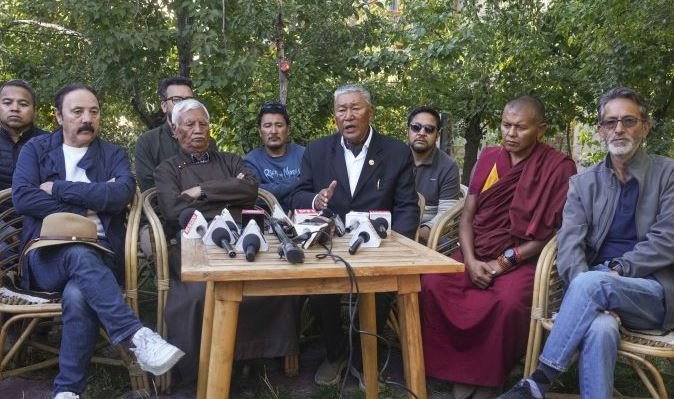Ladakh talks hit roadblock as LAB suspends dialogue, demands judicial probe and release of Sonam Wangchuk
Ladakh unrest deepens over UT status, Sixth Schedule demand as trust gap widens between locals and government
Leh, September 29: The agitation for statehood and constitutional safeguards in Ladakh has entered a new and tense phase, with the Leh Apex Body (LAB) announcing a suspension of talks with the Centre until two key demands are met, a judicial inquiry into the recent police firing and the unconditional release of all detained activists, including renowned climate activist Sonam Wangchuk. The move marks a significant escalation in the standoff between Ladakh’s civil society and the government, as anger simmers over the September 24 protests that left four people dead and dozens injured.
LAB chairman Thupstan Chhewang and co-chairman Chering Dorjay declared that dialogue could not continue without first restoring a “conducive atmosphere” in the region, pointing to a prevailing sense of “fear, grief, and anger” following the use of force against demonstrators. The leadership stated that they remain open to resuming talks on October 6, but only if the government orders a judicial probe headed by a retired Supreme Court judge and releases all detainees without conditions. They also demanded the withdrawal of all cases filed in connection with the protests.
The announcement came shortly after the cremation of the fourth protest victim,a former Army soldier,amid heavy security in curfew-bound Leh. The Union Ministry of Home Affairs later issued a statement reiterating that the government remains committed to dialogue with the LAB and the Kargil Democratic Alliance (KDA), pointing to the progress achieved so far through talks, including enhanced tribal reservations, women’s representation in local councils, and protections for Ladakh’s linguistic heritage. It highlighted ongoing recruitment for 1,800 government posts and expressed confidence that “continuous dialogue will yield the desired results.”
Despite the Centre’s assurances, tensions remain high in Leh, where life has come to a standstill under curfew. Tourist movement is severely restricted, hotels are full of stranded visitors, markets remain shut, and mobile internet services are suspended. The unrest has delivered another blow to Ladakh’s tourism industry, which was only beginning to recover from previous disruptions, including cancellations following the April 22 Pahalgam terror attack.
The LAB’s decision to harden its stance follows growing public outrage over the handling of protests and the detention of Wangchuk under the National Security Act (NSA). Leaders have strongly rejected recent statements by authorities alleging foreign involvement and “anti-national” activities. “The people of Ladakh have always been loyal to the country. We will not tolerate such allegations,” said Chhewang, demanding that the administration provide evidence for the claims. The LAB accused security forces, particularly the CRPF, of using excessive force, resulting in deaths and injuries, while authorities have maintained that the action was taken in self-defence as protests turned violent.
The roots of the agitation stretch back to August 2019, when Ladakh was carved out as a Union Territory following the abrogation of Article 370. While the move ended a decades-long demand for separation from Jammu and Kashmir, many in Ladakh feel that it fell short of delivering justice. The LAB argues that safeguards once provided under Article 370 and Article 35A were lost, prompting renewed demands for political and constitutional guarantees. The movement’s four core demands , statehood, extension of the Sixth Schedule, a separate public service commission and job cadre, and individual Lok Sabha seats for Leh and Kargil remain at the heart of the dispute.
Chhewang explained that despite five years of dialogue with the Centre, progress on these core issues remained limited. The events of September 24, he said, dealt a severe blow to the process, shattering trust between the government and Ladakh’s civil society. “The use of excessive force despite ongoing communication with the Centre shows a lack of seriousness in addressing our demands,” he stated. Dorjay added that unless the government takes the “right steps” before October 6, LAB will not reconsider its decision to stay away from talks.
The Kargil Democratic Alliance, which has coordinated closely with LAB on the statehood movement, has yet to formally respond to the boycott call, though its leader Sajjad Kagili has demanded the immediate release of Wangchuk and other detainees, warning that the Centre’s inaction risks further alienating Ladakh’s population.




